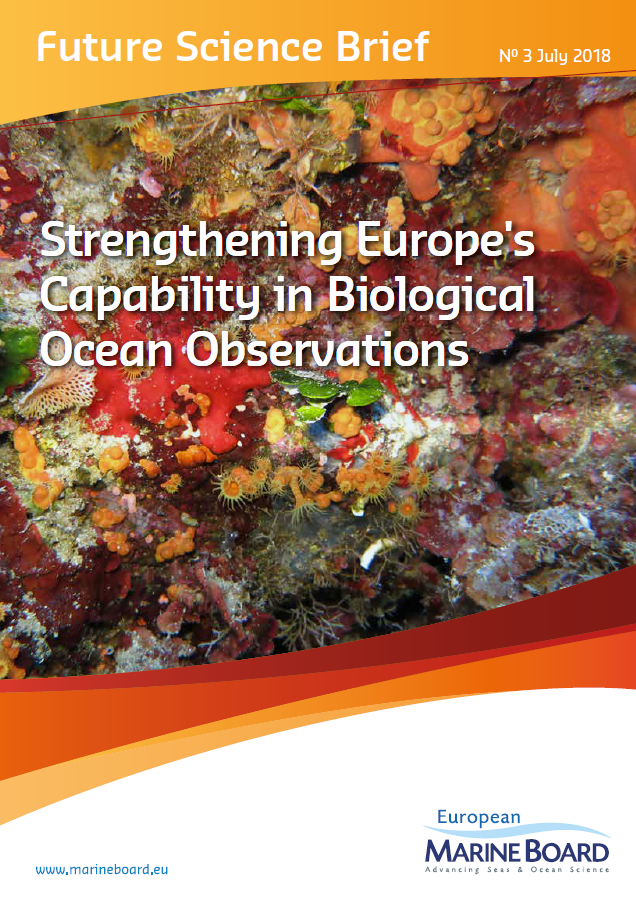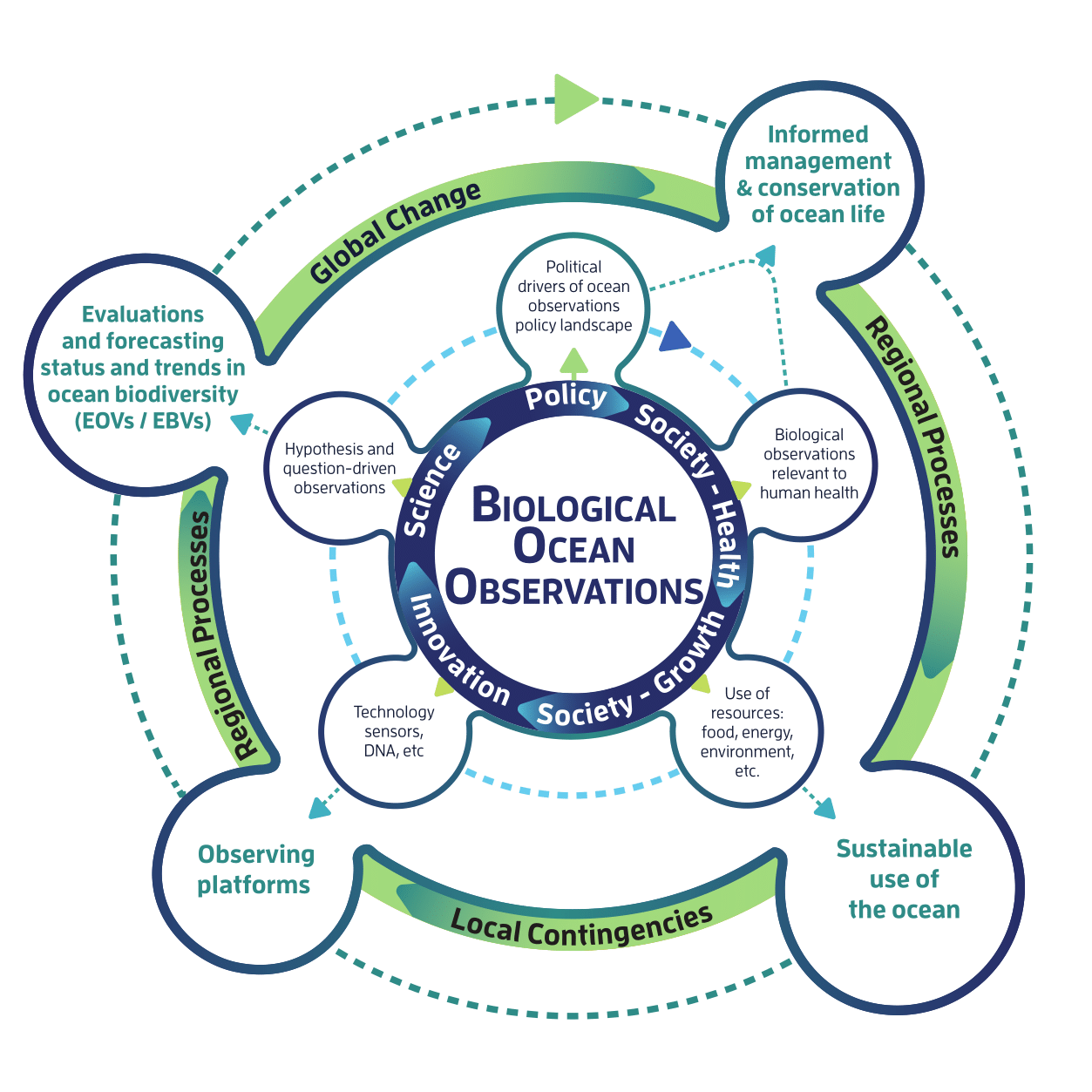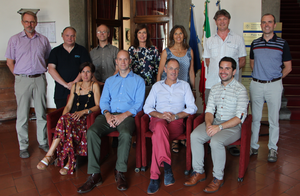Outputs
 Future Science Brief 3 Strengthening Europe’s Capability in Biological Ocean Observation (July 2018)
Future Science Brief 3 Strengthening Europe’s Capability in Biological Ocean Observation (July 2018)
News article on document publication (July 2018)
Fact Sheet on biological ocean observing publication (July 2018)
Impact report in biological ocean observing publication (November 2020)
Frontiers in Marine Science article: An Integrated Approach to Coastal and Biological Observations
She J, Muñiz Piniella Á, Benedetti-Cecchi L, Boehme L, Boero F, Christensen A, Crowe T, Darecki M, Nogueira E, Gremare A, Hernandez F, Kouts T, Kromkamp J, Petihakis G, Sousa Pinto I, Reissmann JH, Tuomi L and Zingone A (2019) An Integrated Approach to Coastal and Biological Observations. Front. Mar. Sci. 6:314. doi: 10.3389/fmars.2019.00314
Poster for the OceanObs'19 conference available here.
EMB Science Webinar on biological time series for science and marine status assessment (July 2021)
 Background
Background
The marine scientific and operational oceanographic communities currently utilize a wide array of biological ocean observation infrastructures, tools and techniques. These range from marine stations and taxonomic analyses to autonomous sensors, hydrophones, animal platforms, state-of-the-art laboratory facilities and omics technologies. As our understanding of marine biodiversity, ecosystem functioning, and the goods and services they provide progress, marine ecosystem and biodiversity observations are increasingly considered crucial for understanding ecosystem change and the impacts of human and natural pressures on marine ecosystems.
Our foresight activity calls for a strategic vision on biological ocean observations to increase the relevant biological ocean observation capacity, and bring together key stakeholders, to provide the long-term support for an integrated ocean observing system that contributes to the European Ocean Observing System (EOOS) and harmonized with the Global Ocean Observing System (GOOS).
Objectives
- Assess the state-of-the-art developments in marine biodiversity and ecosystems research
- Assess the existing list of “Essential Ocean Variables” and provide recommendations of key ecosystem variables and derived products and services that the biological EOOS could provide to meet stakeholders’ needs
- Assess the current landscape of Marine Research Infrastructures, tools and infrastructure capabilities and recommend how this could be integrated to the European and Global Ocean Observing Systems
- Assess the latest developments and requirements for marine biological and biodiversity data with recommendations for future e-infrastructures as an integrated part of the biological ocean observing system
- Assess options for coordinating biological observation infrastructure and priorities needed to achieve holistic trans-disciplinary research and systems analysis of marine ecosystems
- Recommend trans-disciplinary research areas in biological ocean
Propose mechanisms for how the biological component of EOOS could support Europe’s leadership role in marine biodiversity research, ocean stewardship and governance

Related activities
- EOOS conference, Brussels, Belgium, 21-23 November 2018
- European Marine Biology Symposium 53 - EMBS53; Ostend, Belgium, 17-21 September 2018
- 4th GEO BLUE PLANET Symposium; Toulouse, France, 4-6 July 2018
- EOOS Forum: Integrated and Sustained Ocean Observing: a European Strategy; Brussels, Belgium, 8 March 2018
- EurOcean + CNR conference on Ocean Observing System, Capri, Italy, 24 Oct. 2017
- AWI Symposium: High throughput methods for application in marine biodiversity time series, Hannover, Germany, 11-13 Oct. 2017
Meetin gs
gs
- 22-23 June 2017, Pisa, Italy (see news article)
- 24 October 2017, Online
- 28 November 2017, Online
- 15 December 2017, Online
- 24 January 2018, Online
- 5 March 2018, Online
Members
Chair: Lisandro Benedetti-Cecchi, CoNISMa, Italy
Co-Chair: Tasman Crowe, University College Dublin, Ireland
Working Group members:
Adriana Zingone, Stazione Zoologica Anton Dohrn, Italy
Antoine Grémare, University of Bordeaux, France
Asbjørn Christensen, DTU Aqua, Denmark
Enrique Nogueira García, IEO, Spain
Ferdinando Boero, University of Salento, Italy
Francisco Tjess Hernandez, VLIZ, Belgium
George Petihakis, Hellenic Centre for Marine Research, Greece
Isabel Sousa Pinto, CIIMAR and University of Porto, Portugal
Jacco Kromkamp, NIOZ, The Netherlands
Lars Boehme, University of St Andrews, UK
Contact at European Marine Board Secretariat: Ángel Muñiz Piniella Email